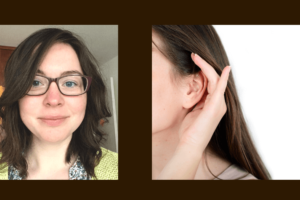Introduction
Hello! It’s Kristine here with the Express to Impress podcast. This week, I am very excited to welcome the very first guest on the Express to Impress podcast.
Can’t read now? Pin it for later!
I am joined by Allyson Plumberg, founder of Rooted Accents: Solutions for Accent Modification. Allyson has a Master of Science degree in Speech-Language Pathology from Arizona State University and has provided speech therapy services and accent modification coaching to students and professionals worldwide.
Allyson, welcome to the show!
Allyson:
Thanks for having me, Kristine
Defining An Accent
Kristine:
Absolutely. I want to kick off the episode with the definition of an accent. So, Allyson, how would you define an accent?
Allyson:
Well, simply put, an accent describes the way you sound when you speak. And accents are built on a set of rules that determine the sounds and patterns of your speech. So by that, I basically mean maybe the vowel sounds or the consonant sounds of your speech. Maybe it includes things like the rhythm or pitch and intonation of your speech. And listen, everybody has an accent even if yours is neutral sounding to you, and you think, “I don’t have an accent! I just sound normal!” To somebody else from a different language background, you definitely have an accent to them.
So I have what we call the General American English accent, and even this accent has so many different variations. Every person has their own micro accent, in fact, and I think that this is a result of people moving around a lot these days. People meet people from other states and countries and live in lots of different places themselves.
Myth #1: Having an Accent is Bad
Kristine:
Awesome. I’m from Northwest Missouri, and I also have a General American English accent. Though I imagine we have our own micro accents.
Now that we’re all on the same page with our understanding of an accent let’s look at some common beliefs surrounding accents. Alright, Allyson, I’d love to get your thoughts on these beliefs. So, fact or fiction: having an accent is bad.
Allyson:
Having an accent is not a bad thing. So that’s definitely fiction. Like I said, everybody has an accent. It’s unavoidable, it’s normal, and it’s natural. Accents are really important to our own unique character and personality. Accents tell really unique stories about who we are and maybe a little bit about our culture even. So in the field that I’m in, which I call accent modification, it’s been traditionally called accent reduction, but I just do not like that term at all. I think it implies that we need to reduce something about you, take something away from you, which is not the case. No one wants to take anything away from you. You’re really great the way you are. So I like to say that were modifying your accent by adding something. We can add skills to help you communicate successfully in all sorts of different situations.
Signs That Accent Modification Could Benefit You
You know, if a strong foreign accident is influencing your English to the point where you might be having some communication breakdowns, accent modification can be really helpful in giving you those additional skills to help you reach your communication potential. You know, if you’re not sure if accent modification would be a good option for you, there are a couple of red flags that I’ll throw out there. For example, do you love talking on the phone with friends in your native language, but you don’t like talking on the phone in English with English speakers? That might be an indication that you have had some difficulty getting yourself across to other people and communicating. And maybe that just means you’re difficult to understand.
There’s also another really more nuanced scenario that I like to throw out. Have you ever been in a conversation where you’re saying something, you’re talking about something that’s important to you, and the other person is just saying “uh-huh.” And they’re just nodding their head. “Oh yeah.” But they’re not actually contributing anything meaningful to the conversation? Well, that’s also an indication that they might not understand what you’re saying, and they’re just trying to be as polite as possible. But they just don’t really know exactly what to say because they can’t understand you.
Are People Asking You To Repeat Yourself?
Kristine:
Absolutely. Another thing I’ve heard people say is that people ask them to repeat themselves quite often. And that’s also, I think, an indication of an accent that might be making it challenging to communicate well in English with someone else.
But I love that you call your work accent modification and not accent reduction. I also don’t like the term accent reduction, and I think accents are beautiful and wonderful, and we should only change them if it’s going to help us communicate better.
Myth #2: You Need to Speak English Quickly
Kristine:
All right, so let’s look at another possible myth here. So, how about speaking speed? Is it necessary for English learners to speak quickly to sound like a native speaker?
Allyson:
Absolutely not! It’s, in fact, a big mistake if you’re speaking quickly all the time. And I know there’s this temptation to think, “Oh, I’m going to sound so fluent and fast and fluid.” But honestly, it’s not how we speak. The General American English accent is this very harmonious balance of fast flow. So we speak some words and some parts of words quickly, and we say some words and parts of words slowly.
So let’s talk a little bit about which ones are fast, which ones are slow. Imagine that you’re sitting at your computer and you are going to do a Google search. What words do you put into the search bar? You’re probably not going to put the, of, and an. You’re going to put the most important content words. So content words are the informative words that we communicate the most information with when we’re talking. So we’re going to draw out these content words, and we’re going to really give a little bit extra stress and emphasis on these words.
On the other hand, function words are those words that are really short. They are more grammatical structures that we just have to have in order to be grammatically sound and correct. So these are like articles: the, an, of. Your conjunctions are often in this category, as well as helping or auxiliary verbs and prepositions. To and of, are two really common prepositions that we rush through. So even within words, there are parts of words that we say more quickly than other parts of the words.
Syllable Stress
And you probably heard about stress and syllable stress. Let’s take the example of every. Every. The first syllable in every has more stress than the second syllable. I’ll say that one more time: every. So we are going to rush through the unstressed syllables as well.
Let me give you a really great example that will help illustrate this. My husband came home from work the other day, and he was talking about a computer code that was not going well at work. So he said, “It basically doesn’t work.” It basically doesn’t work. (Allyson claps hands methodically three times for each beat) There are three beats to those three words: basically, doesn’t, and work. But let’s look at the word basically for a second. It’s a long word compared to work. Basically is three syllables: ba-si-cally. And work is one syllable: work. But listen to how I fill each one of those beats with the entirety of each of those three words. It basically doesn’t work. It basically doesn’t work. So you can see I’m rushing through those unstressed syllables in basically, and I’m drawing out the stressed syllable in work.
It’s Not A Race
Kristine:
Awesome, thank you so much. So yeah, absolutely, with speaking speed, there’s so much more to it than, “Are you speaking quickly like a native speaker or slower?” And we speak quickly in some places, and we slow down in some places. It’s this language of contrast. And I tell people it’s a lot like singing too, where some words are emphasized, and others are not. And our voice goes up and down, depending on what we want to stress. So I think it can be a really fun language when you look at it that way and not a race.
Allyson:
Definitely.
Myth #3: You Need to Enunciate Each Word in English
Kristine:
Alright, so what about enunciating each word carefully? Do you think that language learners must enunciate words carefully to sound like a native speaker?
Allyson:
Nope! This is another thing you should avoid. So we, as General American English speakers, are very, very efficient. We don’t give any extra pronunciation to anything unless we really need to. So when we say words, we and do something, which is called reducing that word, or we make a reduction. So, for example, the word “interesting” is sometimes said as a four-syllable word: in-ter-es-ting. But you’ll often find that in connected, fluid speech, your average speaker is going to say in-tre-sting. It becomes a three-syllable word. So we make a little reduction there. And it’s completely acceptable, even in formal presentations and that sort of thing. People do this all the time.
Reducing Words
And we do it so frequently with those function words. Those are your conjunctions and some of your prepositions, and definitely your articles. So words like “and.” Let’s take the phrase “bread and butter.” I’m not going to go around saying, “I want some bread and butter.” I’m going to say, “I want some bread n’ butter.” Bread n’ butter.
So you can see I really reduce and to become just an “n” sound. With the phrase, “You have your presentation soon.” I’m not going to say “your” with its full pronunciation. I’m going to say you have yer presentation soon. Yer presentation soon. It becomes very fast and reduced. How about this one? “Go to the store” becomes “go tuthu store…tuthu store.”
And lastly, “I have to take a call. I hafta take a call.” “hafta” so we actually even change that V sound in have to become a fafta. “I hafta take a call.”
So if you say everything entirely, you’re going to sound very robotic. And additionally, if you’re having trouble modulating your pitch and intonation, you’re going to sound monotonous, which in America, is a really bad thing. You don’t want to sound monotonous if you’re giving a presentation or speaking to people.
In fact, one other thing I’d like to mention is that people don’t use contractions as much as I think they can when they’re speaking, especially if English isn’t your first language. Saying things like “I am going to work” sounds more stiff than if you could say, “I’m going to work.” Or, “It’s a challenging project.” Say “It’s a challenging project” instead of “It is a challenging project.” It sounds more fluid, and it’s also completely acceptable to use these in more formal speaking situations.
Benefits of Listening Versus Reading in English
Kristine
So Allison, some of my clients tell me that they’re great readers and they feel comfortable writing. But speaking is a big challenge. So I always ask them, “Well, how much are you listening to native English speakers speak?” And sometimes it’s not very frequently. And I always encourage them to read less and listen to more native English speakers speak.
Allyson:
Yes
Kristine:
Because if they are pronouncing words individually or making some of these mistakes as they are reading, that’s reinforcing bad habits. But if they’re learning by hearing how native speakers actually speak the language, which is quite nuanced as we’ve talked about today, I think that can be more helpful for them. Would you agree that it is good advice to steer them away from reading and listening to more native speakers?
Listening to Native Speakers
Allyson:
Absolutely. We’re going to talk about a couple of resources later in this podcast, and all of them involve listening to speakers. That is the most important thing you can do is listen and get that input.
Kristine:
Awesome. Great! Okay, so all of these beliefs about accents are wrong! They are myths! Nothing could be further from the truth, so thank you, Allyson, for busting them today!
I think these are some of the most common misconceptions among language learners. Many of my students and clients initially have them. It drags them down and limits their ability to speak English effectively. But once they let go of these beliefs, their attitude towards speaking English changes. They are more hopeful and optimistic. Speaking English effectively suddenly seems within their grasp.
Tune in Next Week
That brings us to the end of the episode! I invite you to tune in next week to hear the rest of my conversation with Allyson. She will share some success stories with clients and share many accent modification tips and resources for further learning. English learners, you won’t want to miss it! You’ll even get a mini-lesson on how to make the “th” sound.
If you have any questions or feedback, please feel free to send me an email at hello@express-to-impress.com.
Thank you so much for listening to the Express to Impress podcast. If you found this episode useful, please remember to share it with a friend! See you next time. Bye!
Music by Lucas Knutter






Leave a Reply
Your email is safe with me.